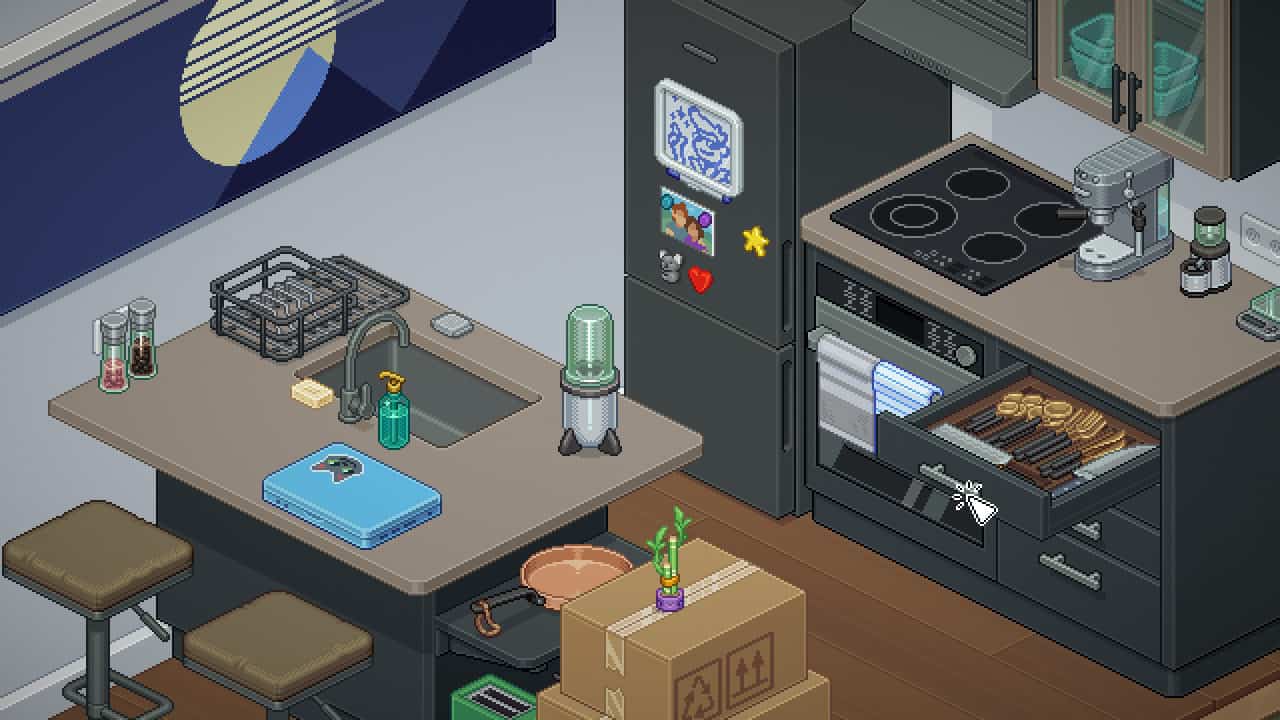Video Gamer is reader-supported. When you buy through links on our site, we may earn an affiliate commission. Prices subject to change. Learn more
Unpacking has you doing just that. It’s a great name—one of those brisk, fuss-free titles that bears an elegant weight. There are stacks of cardboard boxes, into which someone’s possessions have been crammed, along with a loose fill of torn-up paper, so as to soften the knocks of moving. Clicking on each box, you break a seal of parcel tape and pull out the shoes, the shampoo, the clothes, the kettles, the toothbrushes, and so forth. Across houses, you notice things—the slow-swelling bloom of a Blu-ray collection, a framed diploma on a wall, a cafetière that has survived the grind of a breakup. By sifting and sorting, you are, of course, unpacking a life, with its loose fill of torn-up years. The developer is Witch Beam, and I, for one, want to play the studio’s debut, Assault Android Cactus, to see if it, too, prickles with layered meaning.
The plot—if that term applies—follows a woman, from her toy-strewn childhood, through the jumble of university, to her career as an illustrator, which, after a drawn-out start, is gradually furnished with success. What I wasn’t expecting of Unpacking, fool that I am, was fun. It seemed to me one of those games, like Lake, that offer mundane work in the hope of delivering a message. And it is. It’s just that the work, in its demand for order and its relish of economy, has a delicious touch of Tetris about it; objects can be rotated and slotted neatly into satisfying nooks. As for the message, it isn’t quite so pat. Whereas Lake had a clear conservative streak running through it—rooted in rural pleasures, in family and community—Unpacking, though liberal in its scattering of belongings, holds back. Its ideas are passive, requiring close attention.

I was reminded of Gone Home, which, also free of human presence, tracked the breakage of an Oregon family by trawling through its bric-à-brac. But that game had an involving storyline, vested in bursts of voice-over and balled-up letters, to be scrunched and scrutinised. Unpacking, in contrast, has as much of a narrative as does life: underwritten, often lacking incident, and prone to plotlessness. When its happenings do strike—a photograph, harbouring painful memories, in need of hiding; the company, and clutter, of another soul—they lack the weight of texture. This is partly down to the art direction, by Wren Brier, which favours the bright and the pixelated; its rooms, hanging in a chequered void, seem like the sort of light-humoured chambers through which a Sim might skim. For all her struggles, I found it tough to imagine this woman without one of those glowing-green gems dangling above her head.
Indeed, Unpacking has an air of the Simlish. It is rich in the spirit of gleeful acquisition, and, though we may not map out our heroine’s days, or bend her ambitions with curatorial fervour, we do organise her life, tending the quarters from which her talent will spring and awaiting the arrival of larger properties and ever more movables. (Would that all fledgling illustrators could look forward to their bank accounts being lined quite so lavishly with Simoleons as that of our protagonist.) Where the game is at its most emotionally potent, however, is in its disarray. Particularly in its latter hours, it evokes the stomach-tugging futility that daunts the would-be tidy-upper—the kind you feel as you stare at the dusty welter of a bedroom and wonder where the hell to start.

The answer, in Unpacking as in life, is: somewhere small. Heap the socks, lend hierarchy to the drawers, clip the coat hangers to the rail—such are the routines, both methodical and lightly mad, of the successful unpacker. The music, by Jeff Van Dyck, helps in this regard; we get strummed along by an upbeat acoustic guitar, and now and then we come adrift in wandering synth. (I was reminded, in brief flashes, of Rich Vreeland’s spaced-out score for Fez, whose tunes had a dreamy surface, but harboured a hidden dimension of wistfulness—a reverie into the medium’s past.) Van Dyck’s compositions are ignorable, and that is to their credit; they fade in and out, leaving long pockets of quiet in-between, the better for the game’s narrative beats not to be chivvied along by an insistent soundtrack.
Those beats are skilfully conceived and communicated, and, if I failed to be moved by the drama of Unpacking, it’s because I was far too busy appreciating its conception. (It is bound to be the subject of a Games Developers Conference talk, entitled something like “Thinking Inside the Box: The Objects of Your Story.”) There was one moment that epitomised both the shortfall and the masterstroke of Unpacking. I lifted out a children’s book and laid it down, its cover adorned with a smiling pig; then a second, bearing the same design, then another, and another, and—Oh! These are publisher’s copies of her book! The realisation—that her success had been signalled by a stack of pink-daubed books, without a single oink of dialogue—made me think, Hmm, that’s clever. But I didn’t feel the jubilation. When I got to the end, Unpacking took after one of its emptied boxes: collapsing, with a satisfying thwip, into flatness, before zipping into thin air. Neatness is fine for the telling, but a good tale cries out for mess.

